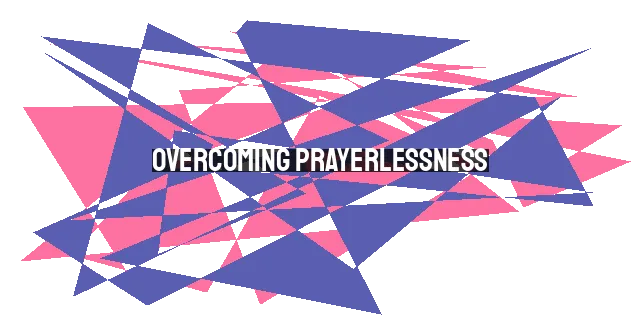Christian Hub
1 year ago
Overcoming Anxiety: Finding Peace in God's Future Grace
Content:
Do you struggle with anxiety? Do you find yourself constantly worrying about the future, feeling overwhelmed by the uncertainties of life? If so, you're not alone. Anxiety is a common struggle that many people face in today's fast-paced and unpredictable world. But what if I told you that the root cause of your anxiety is not what you think? What if I told you that there is hope for overcoming anxiety and finding peace in the midst of life's storms?
In the book of Matthew, Jesus addresses the issue of anxiety and offers a profound insight into its root cause. He says, "But if God so clothes the grass of the field, which today is alive and tomorrow is thrown into the oven, will he not much more clothe you, O you of little faith?" (Matthew 6:30). Jesus is pointing out that the root of anxiety is not external circumstances or the lack of material possessions, but rather, it is inadequate faith in our Father's future grace.
When we struggle with anxiety, we often attribute it to external factors such as financial instability, relationship problems, or health issues. We believe that if only these circumstances were different, then we would be free from anxiety. But Jesus challenges this perspective and reveals that the real problem lies within us - our lack of faith in God's provision and care for our future.
Imagine you had been experiencing persistent stomach pain and had tried various medications and diets to no avail. Finally, you decide to visit a doctor, hoping to find a solution to your problem. After a routine examination, the doctor delivers some devastating news - you have cancer in your small intestine. It's not the news you wanted to hear, but at least now you know the real problem. And the good news is that the cancer is treatable, and there is hope for healing.
Similarly, when Jesus exposes the root cause of anxiety as "little faith," it may not initially feel like good news. In fact, it can be discouraging to realize that our struggle with anxiety is not simply a personality trait or a result of external circumstances, but rather a deeper issue of trust in God. However, knowing the real problem is actually good news, because it means that there is a solution. It means that we can turn to God and seek His help in increasing our faith and finding freedom from anxiety.
So, how do we overcome anxiety and develop greater faith in God's future grace? It starts with recognizing that anxiety is not a sin in itself, but it is a symptom of a deeper issue - a lack of trust in God. We need to acknowledge our tendency to rely on ourselves and our own abilities instead of trusting in God's provision and care.
In Mark 9:24, a desperate father cries out to Jesus, "I believe; help my unbelief!" This simple yet powerful prayer highlights the tension we often feel in our faith journey. We may have moments of strong belief, but also moments of doubt and fear. And that's okay. The key is to be honest with God about our doubts and fears and to ask Him to help us overcome them.
One practical way to cultivate greater faith in God's future grace is by immersing ourselves in His Word. The Bible is filled with promises and assurances of God's faithfulness and provision. When we meditate on these promises and allow them to sink into our hearts, our faith is strengthened, and our anxieties begin to fade away.
In Psalm 56:3-4, David declares, "When I am afraid, I put my trust in you. In God, whose word I praise, in God I trust; I shall not be afraid. What can flesh do to me?" David understood the power of God's Word in overcoming fear and anxiety. He chose to trust in God's promises and found peace in the midst of his trials.
Another powerful tool for overcoming anxiety is prayer. Through prayer, we can pour out our hearts to God, expressing our fears, worries, and doubts. We can ask Him for His guidance, strength, and peace. And as we surrender our anxieties to Him, we experience the peace that surpasses all understanding (Philippians 4:6-7).
Additionally, surrounding ourselves with a community of believers who can offer support, encouragement, and prayer is crucial in our journey to overcome anxiety. We are not meant to face our struggles alone. God has designed us to live in relationship with others, and through the love and support of fellow believers, we can find strength and courage to face our anxieties head-on.
In conclusion, anxiety is a common struggle that many people face, but it does not have to define our lives. Jesus offers us hope and a solution to our anxiety by pointing out the root cause - our lack of faith in God's future grace. By acknowledging our doubts and fears, immersing ourselves in God's Word, seeking Him in prayer, and surrounding ourselves with a supportive community, we can overcome anxiety and find peace in the midst of life's uncertainties. So, let us choose to trust in God's promises and believe that He is able to clothe us with His grace and provision, just as He clothes the grass of the field.
Do you struggle with anxiety? Do you find yourself constantly worrying about the future, feeling overwhelmed by the uncertainties of life? If so, you're not alone. Anxiety is a common struggle that many people face in today's fast-paced and unpredictable world. But what if I told you that the root cause of your anxiety is not what you think? What if I told you that there is hope for overcoming anxiety and finding peace in the midst of life's storms?
In the book of Matthew, Jesus addresses the issue of anxiety and offers a profound insight into its root cause. He says, "But if God so clothes the grass of the field, which today is alive and tomorrow is thrown into the oven, will he not much more clothe you, O you of little faith?" (Matthew 6:30). Jesus is pointing out that the root of anxiety is not external circumstances or the lack of material possessions, but rather, it is inadequate faith in our Father's future grace.
When we struggle with anxiety, we often attribute it to external factors such as financial instability, relationship problems, or health issues. We believe that if only these circumstances were different, then we would be free from anxiety. But Jesus challenges this perspective and reveals that the real problem lies within us - our lack of faith in God's provision and care for our future.
Imagine you had been experiencing persistent stomach pain and had tried various medications and diets to no avail. Finally, you decide to visit a doctor, hoping to find a solution to your problem. After a routine examination, the doctor delivers some devastating news - you have cancer in your small intestine. It's not the news you wanted to hear, but at least now you know the real problem. And the good news is that the cancer is treatable, and there is hope for healing.
Similarly, when Jesus exposes the root cause of anxiety as "little faith," it may not initially feel like good news. In fact, it can be discouraging to realize that our struggle with anxiety is not simply a personality trait or a result of external circumstances, but rather a deeper issue of trust in God. However, knowing the real problem is actually good news, because it means that there is a solution. It means that we can turn to God and seek His help in increasing our faith and finding freedom from anxiety.
So, how do we overcome anxiety and develop greater faith in God's future grace? It starts with recognizing that anxiety is not a sin in itself, but it is a symptom of a deeper issue - a lack of trust in God. We need to acknowledge our tendency to rely on ourselves and our own abilities instead of trusting in God's provision and care.
In Mark 9:24, a desperate father cries out to Jesus, "I believe; help my unbelief!" This simple yet powerful prayer highlights the tension we often feel in our faith journey. We may have moments of strong belief, but also moments of doubt and fear. And that's okay. The key is to be honest with God about our doubts and fears and to ask Him to help us overcome them.
One practical way to cultivate greater faith in God's future grace is by immersing ourselves in His Word. The Bible is filled with promises and assurances of God's faithfulness and provision. When we meditate on these promises and allow them to sink into our hearts, our faith is strengthened, and our anxieties begin to fade away.
In Psalm 56:3-4, David declares, "When I am afraid, I put my trust in you. In God, whose word I praise, in God I trust; I shall not be afraid. What can flesh do to me?" David understood the power of God's Word in overcoming fear and anxiety. He chose to trust in God's promises and found peace in the midst of his trials.
Another powerful tool for overcoming anxiety is prayer. Through prayer, we can pour out our hearts to God, expressing our fears, worries, and doubts. We can ask Him for His guidance, strength, and peace. And as we surrender our anxieties to Him, we experience the peace that surpasses all understanding (Philippians 4:6-7).
Additionally, surrounding ourselves with a community of believers who can offer support, encouragement, and prayer is crucial in our journey to overcome anxiety. We are not meant to face our struggles alone. God has designed us to live in relationship with others, and through the love and support of fellow believers, we can find strength and courage to face our anxieties head-on.
In conclusion, anxiety is a common struggle that many people face, but it does not have to define our lives. Jesus offers us hope and a solution to our anxiety by pointing out the root cause - our lack of faith in God's future grace. By acknowledging our doubts and fears, immersing ourselves in God's Word, seeking Him in prayer, and surrounding ourselves with a supportive community, we can overcome anxiety and find peace in the midst of life's uncertainties. So, let us choose to trust in God's promises and believe that He is able to clothe us with His grace and provision, just as He clothes the grass of the field.



POST COMMENT
For post a new comment. You need to login first. Login
COMMENTS(0)
No Comment yet. Be the first :)